Wales UK
Wales is a nation that is a piece of the United Kingdom and the island of Great Britain. It is flanked by England toward the east, the Irish Sea toward the north and west, and the Bristol Channel toward the south. It had a populace in 2011 of 3,063,456 and has an aggregate range of 20,779 km2 (8,023 sq mi). Ridges have more than 1,680 miles (2,700 km) of coastline and are generally hilly, with its higher crests in the north and focal territories, including Snowdon, its most noteworthy summit. The nation exists in the north calm zone and has an alterable, oceanic atmosphere. In this article you can easily obtain the basic information about the Wales country, including its culture, sports, Government and politics, Education system, Transport system, Economy and tourism places to visit etc.
Introduction
Wales is a beautiful country that is located in United Kingdom and has a total area of 20,779 km 2. Wales is also the island of Great Britain. This is a generally known as the mountainous country and the highest mountains of this country are located in Snowdonia. It has the bordered of Bristol Channel to its south, the Irish Sea to its west and north, and the England to its east. In 2011 this country had a population of 3,063,456 and two-thirds of this population lives in south Wales, mainly around and in Cardiff, which is the capital city of this country, Newport and Swansea, and in the valleys which are nearby. Official languages of this country are Welsh and English. In the duration of the Industrial Revolution, development of the metallurgical industries and mining transformed this country into an industrial nation from an agricultural society. There are three national parks in Wales such as Brecon Beacons, Snowdonia, and Pembrokeshire Coast. It has five Outstanding Natural Beauty areas which include Anglesey, Dee Valley, the Clwydian Range the Wye Valley and the Gower Peninsula.
Medieval Wales
The southern and eastern parts of Great Britain lost to English settlement wound up noticeably referred to in Welsh as Lloegyr, Modern Welsh Lloegr, which may have alluded to the kingdom of Mercia initially and which came to allude to England as a whole. The Germanic tribes who now commanded these terrains were constantly called Season, signifying “Saxons”. The Anglo-Saxons called the Romano-British ‘Walha’, signifying ‘Romanized nonnative’ or ‘stranger’. The Welsh kept on calling themselves Brythoniaid or Britons well into the middle Ages, however the principal composed confirmation of the utilization of Cymru and Cymry is found in an acclaim sonnet to Moliant Cadwallon, by Afan Ferddig c. 633. In Armes Prydain, accepted to be composed around 930– 942, the words Cymry and Cymro are utilized as regularly as 15 times. However, from the Anglo-Saxon settlement onwards, the general population step by step starts to receive the name Cymry over Brythoniad.
Industrious Wales
Before the British Industrial Revolution, which saw a fast financial extension in the vicinity of 1750 and 1850, there were indications of little scale ventures scattered all through Wales. These went from enterprises associated with farming, for example, processing and the produce of woolen materials, through to mining and quarrying. Until the Industrial Revolution, Wales had dependably been dependent on its agrarian yield for its riches and work and the most punctual mechanical organizations were little scale and limited in manner. The rising modern time frame initiated around the advancement of copper purifying in the Swansea zone. With access to nearby coal stores and a harbor that could exploit Cornwall’s copper mines and the copper stores being separated from the then-biggest copper mine on the planet at Parys Mountain on Anglesey, Swansea formed into the world’s real place for non-ferrous metal purifying in the nineteenth century.
The second metal industry to grow in Wales was press refining, and iron assembling wound up noticeably common in both the north and the south of the country. In the north of Wales, John Wilkinson’s Ironworks at Burnham was a huge industry, while in the south; a moment world focal point of metallurgy was established in Merthyr. In the 1820s, south Wales alone represented 40% of all pig press fabricated in Britain.
Modern Wales
In 1979, the Welsh electorate voted on the making of a gathering for Wales, yet there was an extensive lion’s share 80% for the ‘no’ vote. However in 1997 a moment choice on a similar issue secured a ‘yes’, despite the fact that by an extremely limit larger part 50.1%. The National Assembly for Wales was set up in 1999 under the Government of Wales Act 1998 and has the ability to decide how the focal government spending plan for Wales is spent and regulated, in spite of the fact that the UK parliament maintains all authority as far as possible on the forces of the Welsh Assembly.
The administrations of the United Kingdom and of Wales perpetually characterize Wales as a country. The Welsh Government says, “Ribs isn’t a Principality. Despite the fact that we are joined with England via land, and we are a piece of Great Britain, Wales is a nation in its own right.” The title Prince of Wales is still given on the beneficiary clear to the British honored position, presently Prince Charles.
Government of Wales
Welsh government has its own government which is distinct and separate system from other countries of UK.
Wales Climate
This country is situated in the North Temperate Zone. It has a maritime, changeable climate and is one of the wettest countries in the whole Europe. Welsh weather is often windy, wet and cloudy, with mild winters and warm summers.
Wales Economy
Wales has a post-industrial economy and its currency is Pound sterling. Unique and attractive culture of Wales is the main cause of attraction of large numbers of tourists, who play a vital role in the economy of this country. 40% of Welsh males work in heavy industry.
Transport System in Wales
M4 motorway and A55 expressway are two important road networks, Cardiff International Airport is the largest Airport of this country and this country has four ferry ports which are commercial and electric rail system which is a Great Western Main Line’s branch known as South Wales Main Line.
Education system in Wales
Education system of Wales is distinct from other parts of UK because all universities of this country are public universities and Welsh Government is responsible for funding of these universities. University of Wales, University of Glamorgan, Cardiff University, Aberystwyth University and Bangor University are some well-known examples of Welsh universities.
Religion
Christianity is the largest religion in Wales. Roman Catholic is the second and Islam which is also one of the largest religions in Wales other than Christianity.
Wales Culture
Wales has a unique culture including its own customs, language, music and holidays. National Museum Cardiff, Big Pit National Coal Museum, St Fagans National History Museum and National Library of Wales are contributing in Wales’s culture. Cockles, Cawl cennin, Welsh lamb and Welsh cakes are some traditional foods of Wales. Christmas and Easter are traditional religious festivals of this country.
Sports of Wales
Many sports events are held in Wales such as Rugby World Cup, FIFA World Cup, Commonwealth Games and the Rugby League World Cup. Football, Rugby Union and Cricket are some popular games/sport which are played and watched by Welsh people.






